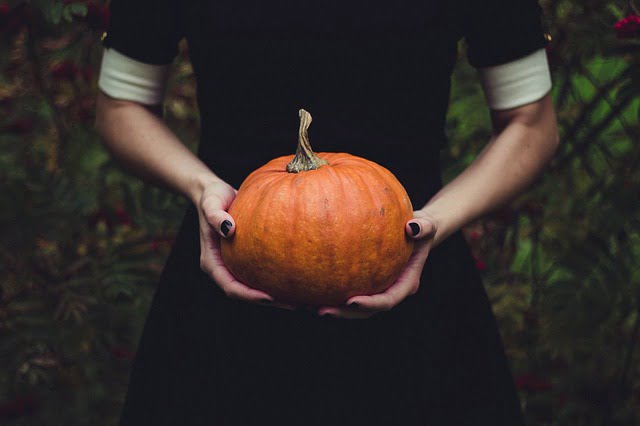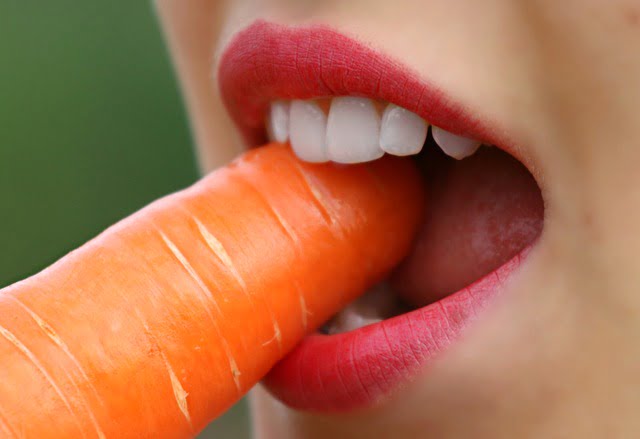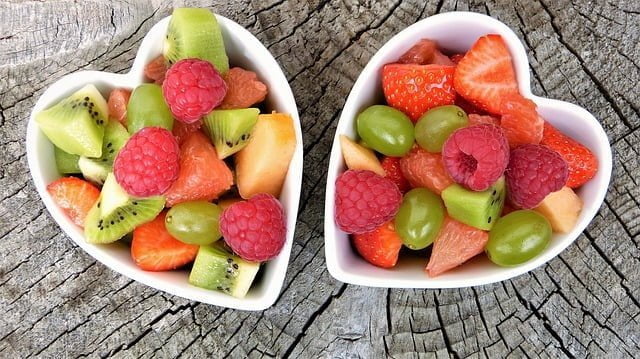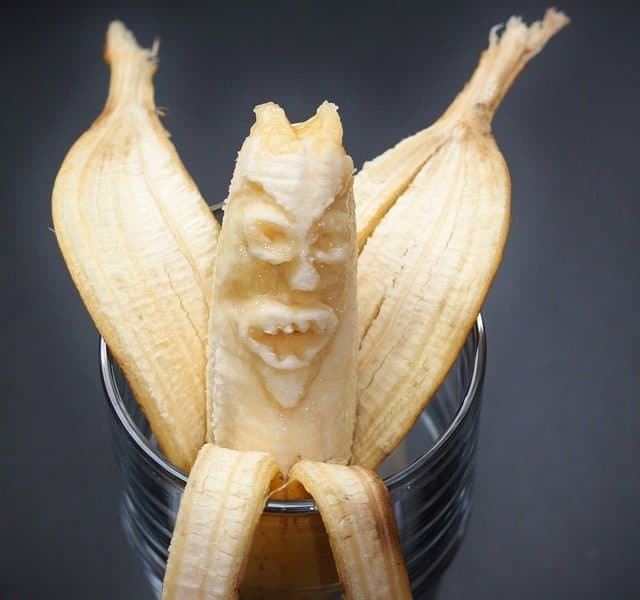Eating, sex and sleep: our most primal activities. Some foods are considered kinda sexy, and you and a lover (or two or three) may like experimenting with different foods to titillate.
Or, you may not have your very own high-tech masturbation tool, and need to borrow a carrot or cucumber out of the fridge. But, is introducing foods into your vagina a smart thing to be doing?
Well, yes and no. Some foods just aren’t an issue and you can go nuts (ehem – don’t use nuts), but others could be problematic.
Overall, no gynaecologist is going to recommend putting food in your vagina, but you can bet they haven’t always taken their own advice.

There are many things to consider before offering such blanket go-for-its when it comes to food in the vagina. The potential for danger to the vagina and vulva is what you need to assess.
You’ve probably already used food in your vagina without issue, but remember these kind words of advice for next time. So here goes all the things that can go wrong using food in your vagina.
Important guidelines for using food vaginally
- If it hurts, stop
- If you have an allergy to any food type, don’t get it near your vagina or vulva
- If you have a sensitive vagina or vulva, avoid
- If you are prone to vulvovaginal infections, avoid
- If you feel irritated (rash, swelling, inflammation) after contact with a food, make a mental note not to use it again – you may have allergic contact dermatitis
- Don’t use any food for very long, and avoid food staying in the vagina for long periods of time or getting stuck
- Food used on the clitoris or vulva is typically much safer than inserting anything
- If you have a very robust vagina that has never had a thing go wrong, you are probably going to be ok with a little foodie experimentation, but consider yourself warned!
Foods you can probably use without too much issue (as long as the caveats are adhered to!)
Long vegetables or fruits with hard skins (cucumbers, carrots, etc.)
You only want to choose vegetables or fruits that can A) be washed prior to remove any germs and dirt, and B) can’t get sucked up into the vagina with no way to get them out.
Remember that all fruit and vegetables are covered in microbes from where they were grown, and then secondary bugs during the transportation and sale process.
Before you put that cucumber into your vag, remember how many people may have picked it up and put it back down it in the grocery store. A zitty teenager with poor personal hygiene may have stacked those long slender beauties on the shelves.
Covering vegetables in plastic wrap is common in some places, but it has, for example, just been banned in New Zealand supermarkets. Plus, plastic wrap also has germs on it too.

Bugs aren’t your only concern, however, since most vegetables and fruits are coated in some kind of poison or another, either to keep them free from pests or to increase their shelf life. Yuck. Organic vegetables are covered in way more microbes, since they have not been treated with pesticides and herbicides.
It doesn’t mean they are bad microbes for you to eat, but your vagina is a different ecosystem and doesn’t have the barriers in place that your digestion does. Your vagina and vulva are raw mucous membrane, and permeable.
How likely are you to get a vaginal microbial infection from a vegetable? Well, to be fair, not that likely. But, we gotta say it. To circumvent this, wash it and use a condom over the vegetable or fruit to protect your vagina. Remember to always use lube with condoms!
Long, strong vegies and fruit aren’t going to change the pH of your vagina, because all the juices are kept inside the skin. So, don’t peel them or bite off the end.
What not to use
Smaller or round vegetables and fruits
Fruits and vegetables that are short or small are not recommended, since the vagina has very strong suction and you can end up with, say, a grape, sucked right up to the top of your vagina. You then can’t get it out without great difficulty.

Any kind of berry is too small. Soft fruit and vegetables (plums, tomatoes) are too soft and squishy. Avoid citrus or acidic fruits that may sting. Avoid onions or garlic for the same reason.
Bigger or round fruits and vegetables are workable if that’s what you’re into, but for example an orange (unpeeled) is likely going to be too big for most vaginas to fit comfortably. Likewise for potatoes.
Broccoli and cauliflower
No. These vegetables get their bits everywhere, and are a weird shape, which may result in lots of ‘bits’ getting stuck in your vagina.
Using a banana (peeled or unpeeled) in your vagina
If you’ve ever tried putting a banana into your vagina, you’ll know just how difficult it is. There are two types of vagina banana: skin on or skin off. The skin on variety is frankly unpleasant. Those end bits are scratchy and hard and just not a vaginal treat. Unpeeled is prone to snapping quickly in half, with one half stuck inside your vagina, and the other ready to eat.

Chilli or hot sauce
Just don’t. You will immediately regret it, and the regret lasts as long as the sting when you wipe chilli in your eyes or nose by mistake while cooking.
Dairy products
Whipped cream, ice cream or any other dairy product that contains flavourings and sugar should probably be very limited.
A squirt of whipped cream onto the vulva that gets licked off immediately isn’t a really big deal, but using ice cream as lube during a big sesh is not great. While your healthy flora, lactobacilli, like to eat lactose, this is not how they are fed.
But what about live yoghurt?
The exception to dairy products is live yoghurt. We talk more about using yoghurt vaginally – it has to be alive to be any use.
Using fruits and vegetables anally
The suction in the anal canal is even more advanced than the vagina, so using anything that can’t get sucked up should be ok, but watch those scratchy ends. Handles are your friend!
The anal canal is pretty delicate, and curves in places a vagina doesn’t, so be gentle.
Foods on penises
Penises are much more robust than vaginas when it comes to sex play with food. Normal rules apply here with sensitivities, so don’t use a food if you are allergic or have a reaction. Don’t try to put fruits or vegetables inside the urethra.
When things go wrong A large percentage of people who show up to the emergency room with dire medical problems regarding foods they’ve put into their vagina have mental wellness challenges.
This is a sad but true fact of gynaecological emergency admissions. Then there’s just the things that get stuck, often in the anal canal, that have to be dredged out after an experiment gone wrong.
Here are some terrifying examples of stuff found in vaginas in the ER:
- A raw chicken
- A tiny pet turtle
- Exploded batteries
- Steak (resplendent with maggots)
- Potato (one used as a prolapse-support device and one used as a tampon that sprouted)
- Very old tampons
- $9,000 in cash wrapped in cling film
- Coke bottles (yes, two)
- Spray cans
- Lost dildos
- Screwdriver
- Acupuncture needles
- Razor blades
- Shards of glass
- A whole packet of Oreos
- Chinchilla semen allergy
- Shampoo bottle
- An apple
Don’t be these people. Be safe with sexy foods!
Slippery slimy food lubes
Coconut oil
Technically a food, and we love coconut for lube and massage oil, but if you are prone to pH problems, coconut may need to be used sparingly. Most people are fine with it, but do a test run. Don’t use any oils with condoms, as fats break down latex.
Aloe vera
Sort of food, but also great for lube so long as it is 100 per cent aloe vera and you are not sensitive.
The most comprehensive vaginal microbiome test you can take at home, brought to you by world-leading vaginal microbiome scientists at Juno Bio.
Unique, comprehensive BV, AV and 'mystery bad vag' treatment guide, one-of-a-kind system, with effective, innovative treatments.
Promote and support a protective vaginal microbiome with tailored probiotic species.





